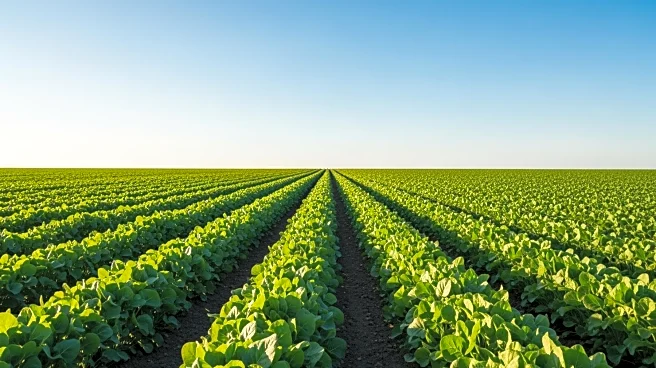What's Happening?
Washington State University (WSU) researchers have conducted a study on cover crops, focusing on their viability as biofuel sources without harming soil quality. The research, led by scientists from WSU and the Pacific Northwest National Laboratory, examined
four cover crops in Washington's fields. Triticale, a wheat-rye hybrid, and hairy vetch, a legume, showed promising results. Triticale produced high yields, while hairy vetch added nitrogen to the soil at low costs. The study explored biofuel potential using hydrothermal liquefaction, a process that converts biomass into fuel. This technique allows different types of biomass to be mixed, facilitating biofuel production. The research aims to provide refineries with more renewable feedstocks and help farmers grow additional crops that benefit both their land and income.
Why It's Important?
The study's findings have significant implications for the agricultural and biofuel industries. By demonstrating that cover crops can be used for biofuel production without negatively impacting soil quality, the research offers a sustainable solution for farmers. This could lead to increased biofuel production, reducing reliance on fossil fuels and contributing to environmental sustainability. Additionally, farmers could benefit economically by selling cover crops as biofuel sources, enhancing their income during the off-season. The ability to mix different biomass types for fuel production simplifies the process, potentially expanding the market for biofuels and encouraging diverse crop cultivation.
What's Next?
Further research is needed to confirm the long-term benefits of using cover crops for biofuel production. The study's promising results may lead to collaborations between farmers, researchers, and biofuel processors to optimize crop selection and biomass conversion techniques. As the demand for renewable energy sources grows, the agricultural industry may increasingly adopt cover crops for biofuel production, contributing to a more sustainable energy landscape. Policymakers and industry leaders might explore incentives to support farmers in transitioning to biofuel crop cultivation, fostering innovation and sustainability in agriculture.
Beyond the Headlines
The integration of cover crops into biofuel production raises ethical and environmental considerations. While the approach offers economic benefits to farmers, it also supports global efforts to combat climate change by reducing carbon emissions. The research highlights the importance of balancing agricultural practices with environmental sustainability, encouraging a shift towards renewable energy sources. As the biofuel industry evolves, stakeholders must address potential challenges, such as ensuring equitable access to resources and maintaining soil health, to maximize the positive impact of this development.
















